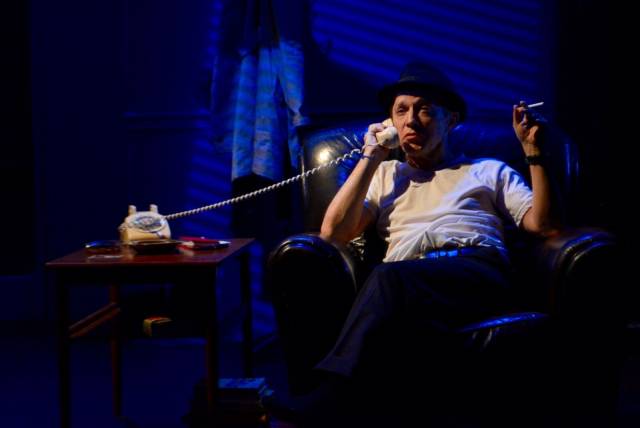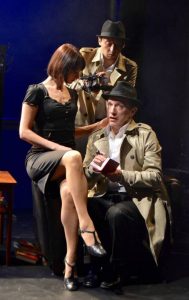

Based on the book by Paul Auster, City of Glass commences its prismatic tale with a case of mistaken identity after which signs are generally loosened, if not wholly severed, from what they signify. This detachment of signs unfolds in a detective-noir framework in which author and detective are one and the same; indeed, identities shift from one person to another until every character seems a dispersion of one, namely, the author, with the director and adapter, Edward Einhorn, inserting himself in, generally awkwardly, as well.
While one may be tempted to define City of Glass as theatrical and literary onanism, this isn’t always such a bad thing, if it is artfully done. The pulpy search for answers itself, the tropes of the genre, as it were, are appropriated for use in the examination of one’s splintered self; as the narrator attempts to come to terms with his own identity and with the representations and significations that articulate a person, everything is herded into the realm of language, the mechanics of which are questioned and deconstructed. Identity itself becomes a language, transferable from one referent to another. Thus, in questioning the mechanics of language, and making identity a language, City of Glass posits and questions identity as a product of a systematic structure like language; in questioning his own identity, the narrator is questioning the validity of identity in general. Whenever you start delving into ideas such as these, inevitably a whole kaleidoscope of ideas opens up, but this is more or less the initial progeny of the unique marriage of detective fiction and the theater of the absurd that is City of Glass.

Fortunately, the script handles the kaleidoscope deftly, often humorously, and avoids the pretentiousness that often attends such heady pursuits. This is perhaps because it acknowledges the doubt, and, eventually, the fear that occurs when entering into the rabbit hole of language and its uncertainties, but without losing the sense of liberation that that doubt and uncertainty can bring. One is reminded of Raymond Chandler’s essay “The Simple Art of Murder,” in which he states, ‘Down these mean streets a man must go who is not himself mean, who is neither tarnished nor afraid… The story is his adventure in search of a hidden truth, and it would be no adventure at all if it did not happen to a man fit for adventure.” In this case, that man is not the detective iteration of the narrator, but more like the author who is delving into himself.
Robert Honeywell, who does all of the talking in this play, brings a terrific coolness appropriate to the genre from which the play borrows, and demonstrates a fine ease as he moves through shifting personas, into madness and obsession and back again. The performers/dancers Mateo Moreno and Diana Rose Rivera help tell the story with wonderful physical theater that is sometimes funny, sometimes mesmerizing.
The end result is akin to emerging from a dream where you may or may not have learned something about yourself, but probably had a pretty interesting time nonetheless.